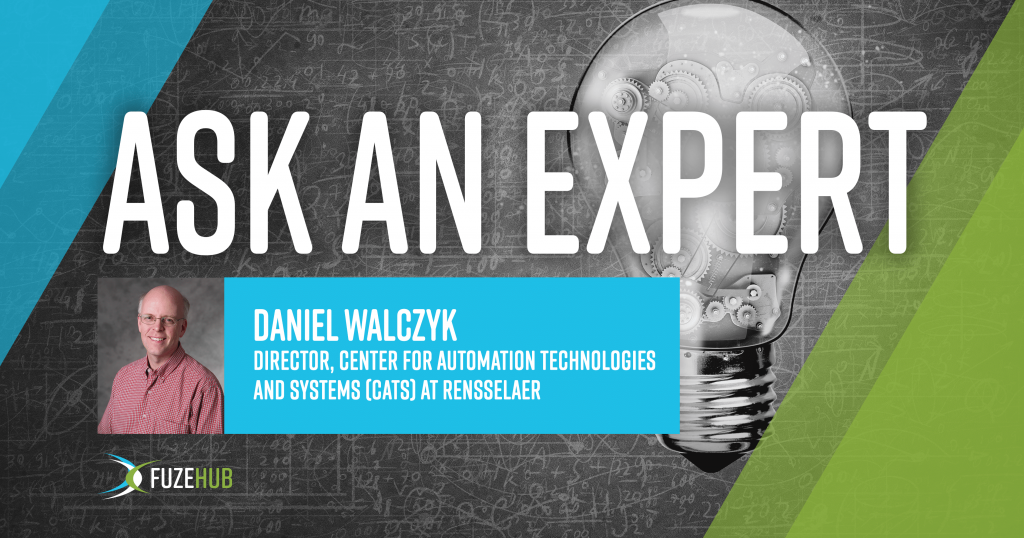For this edition of Ask An Expert we spoke with Daniel Walczyk, Director of the Center for Automation Technologies and Systems (CATS) at Rensselaer, a state-designated Center for Advanced Technology since 1989. In this role, he assists client companies with applied manufacturing R&D to help them meet specific business objectives – increasing productivity, profitability, domestic and international competitiveness, and the number and quality of products offered – so that they can grow and create jobs.
Describe the type of company that could benefit most from working with CATS.
Manufacturers, manufacturing start-ups and product design companies looking to contract manufacture. We have worked with companies ranging in size from garage start-ups (literally) to Fortune 500 companies, mostly in New York.
What should a company expect from working with you?
We are typically introduced to the company through referrals and networking events. We then hold a teleconference with the company to understand their manufacturing/production issues and for them to understand our capabilities.
We usually follow up with reciprocal visits. When CATS visits the company, we conduct a manufacturing audit of their current facility and provide them with a brief report on our findings. If there’s agreement, we develop a statement of work (SOW) and budget and commit to in-kind cost share using NYSTAR funds. If needed, we help the company find third part funding for the proposed project. The project starts once contract negotiations are finished.
What would you say are the most common issues that bring manufacturers to you?
- Acquiring critical manufacturing skills and knowledge – this is achieved by the company working with our skilled technical staff and more than 30 affiliated faculty members.
- Developing a viable manufacturing strategy – we provide a pro bono manufacturing audit and usually include evaluation of future manufacturing needs as a project task.
- Finding qualified and reliable workers – we connect RPI engineering students with companies through internships/co-op opportunities, recruit engineering students to work on industrial projects and encourage the company to hire them after completion, and we help the companies implement automation when they simply cannot find enough skilled workers.
- Improving/modernizing their plants and equipment – all hardware projects involve custom design of new manufacturing processes/equipment and/or specification of new equipment to meet the company’s production and quality needs
- Improving process efficiency, capability and quality – Nearly half the CATS faculty are involved in process design, modeling, optimization and prototyping, so there is a large pool of expertise for companies to draw from
- Third party funding – CATS will help the company write a successful funding proposal.
What is your biggest single piece of advice to a development-stage manufacturer?
Actually, there are two pieces of advice we like to give: (1) Don’t underestimate the difficulties in scaling up for production. (2) Don’t jump to full automate for a manufacturing process/line immediately. Take a go-slow approach, i.e. automate incrementally and build from your successes.
Can you share a success story with us?
Plug Power is engaged in the design and manufacturing of hydrogen fuel cell systems that replace conventional batteries in electrically powered material handling equipment (fork lifts and automated guided vehicles) and service vehicles (such as airport ground support equipment and parcel delivery vans). The company, which was founded in 1997 as a joint venture between DTE Energy and Mechanical Technology Inc., is headquartered in Latham, and has facilities in Spokane, Washington. It employs about 650 people.
Hydrogen fueling is currently a completely manual process that requires operator attention throughout the duration of fueling. Plug Power was interested in automating the fueling process both for conventional lift trucks and going forward to support automated guided vehicles. They reached out to CATS because of our reputation in advanced robotics and automation.
Successful completion of the feasibility study and proof of principle using CATS robotic hardware positioned the team well to respond to a solicitation from US Department of Energy’s Fuel Cell Technology Program. CATS leveraged past successful work with collaborators at the National Renewable Energy Lab (NREL) and partnered with Plug Power to prepare a $2.5M proposal to further develop the autonomous fueling concepts from the laboratory proof of principle. This proposal was favorably reviewed by US DOE, and Plug Power is in the final stages of contract negotiation with US DOE.
What is CATS relationship with FuzeHub?
FuzeHub has become the single most important business development strategic partner for CATS. We enthusiastically support and attend all FuzeHub events, were a proud sponsor of the Commercialization Competition, and have benefited from FuzeHub serving as a marketing sponsor of our Manufacturing Conference.
During the time period of Fiscal 2018 and YTD fiscal 2019, we participated, as a NYSTAR resource, in the FuzeHub Solutions Forums held in Saratoga, Stony Brook, Rochester, Plattsburgh, and Brooklyn. Additionally, we attended both Commercialization Competitions, the Herkimer B2B event, and the recent Schenectady Scale-up event. From our participation in these events, and direct referrals from Steve Melito, we have had meetings with 46 companies. Most of those resulted in site visits for CATS technical staff to conduct a manufacturing audit. From these company visits, nine are in SOW stage, and seven involve active projects.
For our fiscal 2018 economic impact report to NYSTAR, six of the 27 companies who provided Economic Impact letters were companies that either were introduced to us by FuzeHub or were co-awardees with us of funding from the Lawrence Innovation Fund. The total economic impact reported from the six FuzeHub projects totaled $2.2 million. CATS has won five Lawrence Innovation Fund awards totaling ~$300,000 that directly benefited our client companies.
One FuzeHub introduction, The Brill Group, has evolved into a multi-institute (RPI CATS, Union College, SUNY New Paltz, SUNY ESF, and Howard University) initiative to seek NSF Gen-4 ERC funding, and other funding, for the launch of a Bio-industrial Materials Institute.
In sum, the value of FuzeHub to the NYSTAR resources, and ultimately to the manufacturers that the resources help, is immense.

